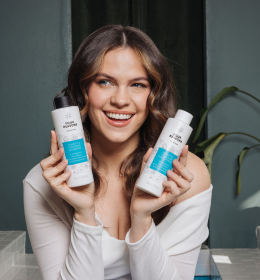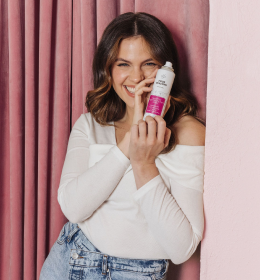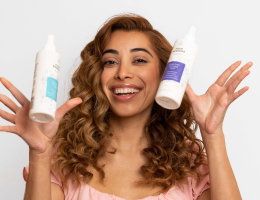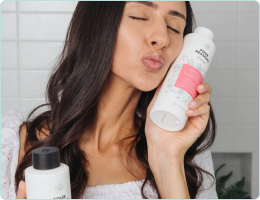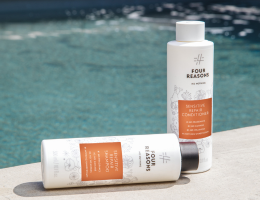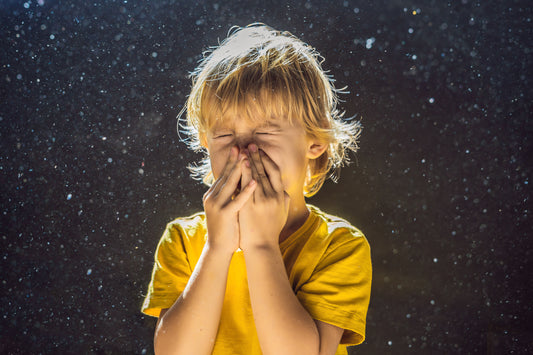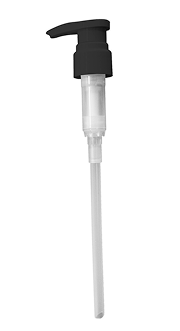You’ll find (harmful) fragrance chemicals in most beauty products. They’re in your shampoo, your hairspray and your favorite shower gel . They’re also lurking in your cleanser, and you’ll probably find them in your leave-in conditioner too.
Don’t believe us? Grab a bottle from your bathroom cabinet, and spin it around so that you can read the back. Chances are that you’ll see the phrase ‘fragrance’ written on the label. Now ,many people assume that these unspecified fragrances refer to herbal extracts or natural perfumes - chosen because they impart a nice, floral note to their favourite beauty products. Think rose oil, honeysuckle extract or coconut shell.
Unfortunately, the truth is rather different.
See, regulations allow cosmetic manufacturers to hide 1000's of different chemicals under the moniker - arguing that the exact composition of a product’s fragrance is a ‘trade secret’ that deserves to be protected from prying eyes. There’s no getting around the fact that manufacturers use this loophole to hide all sorts of toxic chemicals in your favorite beauty products.
We’re talking about things like butylphenyl methylpropional, diallyl phthalate or butylated hydroxytoluene, which is associated with all sorts of respiratory problems.
These chemicals are normally used because they’re cheap, and they allow the manufacturers to create a pleasant fragrance without hiking the price of their product, but there’s a serious downside to their use.
According to a report from the National Academy of Sciences, 95% of fragrance chemicals are derived from petrochemicals like benzene, which means that they’re made by distilling crude oil. Others are made by oxidising alcohol, or extracted from coal tar.
But the source doesn't really matter all that much. It’s icky to think about, but plenty of modern chemicals come from all sorts of unlikely places and there’s no intrinsic reason to distrust something that’s derived from an ingredient like benzine.
No. The real problem is that:
- Fragrance chemicals are known to be dangerous
- There’s very little regulation here in the US, which means that toxic compounds crop up in all sorts of unexpected places
And it’s these points we’ll be exploring in this article.
What makes hidden fragrance chemicals so dangerous?
Most of us are inclined to trust the big-name brands that make our beauty products . We assume that they’re testing their products before they ship them, and we’re confident that government organisations would step in if anything untoward were taking place. But the reality is that cosmetic and fragrance products are largely unregulated here in the US.
The FDA (Food and Drug Administration) don’t ask to test new chemicals and they don’t ban many either. In fact, the FDA only restrict the use of 11 different cosmetic ingredients - a pretty low number, given that the European Union ban over 1,400 different ingredients.
And we know that a *lot* of these unregulated chemicals are harmful. Studies have shown that they can disrupt your hormones, damage your lungs and irritate your skin. We’re also starting to discover that some ‘fragrance’ chemicals can disrupt fetal development and cause all sorts of environmental damage. But it’s hard to find accurate information about the true risks, which is why we’ve compiled this list of the seven deadly sins associated with everyday fragrance products:
Sin #1: Fragrances can disrupt your hormones
Phthalates are a type of chemical preservative that’s found in over 90% of fragrances. Unfortunately, phthalates are structurally similar to some human hormones (notably estrogens, androgens and thyroid hormones).
These structural similarities allow them to bind with receptors in your brain and genitals - displacing the hormones that should accumulate there, and messing up all sorts of chemical processes. Sometimes, this means altering the metabolism of your liver or upsetting your mood, but studies show that phalates can also wreak untold damage on your reproductive system; reducing sperm counts in men, and increasing the chances that women will suffer a miscarrige.
Sin #2: Fragrance chemicals may be capable of causing cancer
Phthalates are also thought to promote certain types of cancer. Including cancers of the breast and liver. It’s hard to find definite evidence of a link because no one is willing to fund studies into the relationship between such a widespread chemical and the world’s most common forms of cancer BUT animal studies show that there’s a definite correlation between phthalates and cancers, and it is worth noting that the United States Department of Health and Human Services list one of the most common phthalates (dibutyl phthalate) as a ‘known carcinogen’.
The bad news doesn't stop there either. See, lots of fragrances also contain an ingredient called butoxyethanol - an irritating compound that’s been shown to damage the kidneys, liver and lymphatic system. The International Agency for Research on Cancer has confirmed that butoxyethanol is a carcinogen, and the chemical is banned in most of Europe but it still crops up in a lot of American beauty products.
At No nothing, we believe “ less is more" when it comes to ingredients. Our line is a cleaner healthier option that can replace everything in your hair routine — without the harmful chemicals.
Check our new productsSin #3: Some fragrances can trigger an allergic reaction
By far the best known side effect of fragrance chemicals, it’s still worth mentioning here because some people are very allergic to some of the compounds found in everyday products like shampoo or hair gel.
If you’ve ever found that your favourite beauty product leaves you with a nasty rash, itchy throat or sore head, it’s probably because your sensitive to one or more of the chemicals hidden under that pesky ‘fragrance’ label. More specifically, you’re probably allergic to something like benzyl benzoate or butylphenyl methylpropional.
These chemicals are widely used (and highly prized) but they are known to be incredibly irritating. So much so that they’re banned in most of the world. There’s also some chance that these chemicals can actually sensitize your skin, which means that you might develop an allergy out of nowhere, or find that you’re suddenly struggling to fight off acne.
All in all, we think they’re best avoided and they’re one of the main reasons that people go all-in on a fragrance detox.
Sin: #4 Fragrance chemicals are linked to the development of asthma
A lot of these fragrance chemicals can also cause asthma. See, asthma is an inflammatory response that’s supposed to help your body fight off foriegn invaders. The idea is that blood rushes to your throat; carrying white blood cells to the scene of the crime, and increasing your chances of destroying a nasty virus.
Unfortunately, toxic chemicals trigger the same immune reaction but there’s nothing your white blood cells can do to neutralise the threat, which means that you’re left struggling for breath (or wheezing uncontrollably).
According to the Campaign for Safe Cosmetics, fragrance chemicals are one of the most common triggers for allergic asthma. Particularly the highly sensitizing phthalates that we mentioned before. Research published in Environmental Health Perspectives also points the finger at chemicals like butylated hydroxytoluene, which is known to irritate the respiratory system
Sin #5: Fragrance chemicals are bad for the environment
Some fragrance chemicals are derived from natural plants, but most are synthetic, which means that they’re created using a laborios chemical process that releases all sorts of waste fumes. Some fragrance chemicals are also derived from crude oil, which means that their use encourages companies to dig up and burn fossil fuels.
The long term impact of these activities may be difficult to quantify, but there’s no doubt that they’re bad for the planet, and your local environment too.
Sin #6: Fragrances can trigger migraines
Migraines are incredibly painful headaches that are often accompanied by nausea and increased sensitivity to light and sound.
Way back in 2014, the International Journal of Headaches published research showing that up to 75% of migraines were caused by smells, and further research indicates that fragrance chemicals may be one of the main culprits.
This includes chemicals like butylphenyl methylpropional, which is known to mess with your nervous system, and Acetaldehyde - a preservative that’s labelled as a ‘dangerous chemical’ in most parts of the world.
These fragrance chemicals are thought to interfere with your nervous system; encouraging your blood vessels to narrow and restricting the flow of blood to your brain - triggering (incredibly painful) headaches that force you to write off the rest of the day, and retreat to a dark room while your body recovers.
Sadly, this effect is incredibly pervasive. Spraying hairspray on your head is definitely enough to trigger a migraine, but you can also develop headaches if, say, your co-worker sprayed some perfume after lunch. Or your office cleaning staff switched to a new air freshener without telling you, which is why groups like the Canadian Center for Occupational Health and Safety ask people to be very (very) careful about products they use in public spaces.
Sin #7: Fragrances can disrupt the development of your fetus
This one’s only relevant for pregnant women, but it’s a big one, and we think it’s definitely worth thinking about.
According to the Campaign for Safe Cosmetics, some endocrine-disrupting chemicals (including dibutyl phthalate) can damage developing children if they leach into your bloodstream and work their way into the womb. These chemicals have a variety of affects (none of them nice) but the main issue is that they can disrupt the development of reproductive systems - increasing the likelihood that your child will be infertile.
Doctors also think that some fragrance chemicals could increase the likelihood that your child will be born with allergies so it’s best to avoid them altogether if you can.
Natural fragrances are just as bad
If you’ve read all this and you’re feeling worried, you might be thinking that it’s time to ditch the chemicals and stick to natural beauty products. Sadly, natural fragrance chemicals are just as dangerous. They often trigger the same allergic reactions as their synthetic cousins, and they’re just as likely to bring you up in a nasty rash. Natural fragrances (including essential oils) are also linked to the development of conditions like asthma so if you’re struggling with any kind of sensitivity, it’s best to steer clear!
Instead, we’d recommend going 100% fragrance-free. This means picking products that don’t contain any kind of fragrance whatsoever, and while this can be a little bit tricky, it’s definitely the best option for your health.
If you’re sick of exposing your body to toxic chemicals and you’re ready to kick the habit, you might find it useful to read this article on starting your own fragrance detox.
References and further reading:
#1 http://www.safecosmetics.org/get-the-facts/chemicals-of-concern/fragrance/
#2 https://www.forceofnatureclean.com/truth-about-toxic-fragrances/
#3 https://www.scientificamerican.com/article/toxic-perfumes-and-colognes/
#4 https://ntp.niehs.nih.gov/ntp/htdocs/st_rpts/tox030.pdf
#5 https://www.niehs.nih.gov/health/topics/agents/endocrine/index.cfm
#6 https://www.madesafe.org/science/hazard-list/phthalates/


